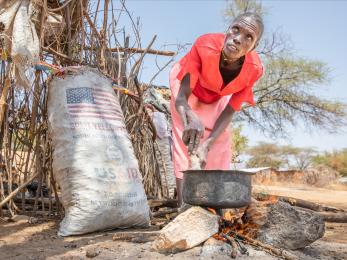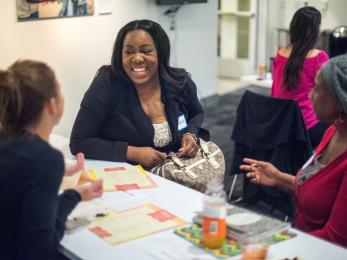Opening the future for young people in Kenya

Imagine if the entire population of the United States was struggling to find work. All 372 million people. And then multiply that number by 5. Over 1.5 billion people struggling to find jobs and support their families. For young people in developing or emerging economies, where the lack of experience and professional networks makes jobs even harder to come by, they’re four times more likely to be unemployed than their older counterparts.
But what if those young people facing disparity had equal access to the job market? What if people like Martha, a young and skilled seamstress and designer in Kenya, could find work — even build their own businesses — all from their smartphones?
In a country where employment challenges are staggering with over 40 million people struggling to find work, the obstacles Martha faces in Kenya aren’t unusual. But where challenges persist, Mercy Corps creates solutions.
The business of making connections: Adam Grunewald, developer and CEO of Lynk

That’s where Adam Grunewald comes in.
The fact that eighty-five percent of Kenya’s economy is backed by the “informal” sector, often called the “gig economy” in the United States, is what sparked an innovative solution to help young people like Martha make connections and grow their businesses. Mercy Corps has been working with Adam to make his dream of a "LinkedIn for the linked-out community" in Kenya a reality.
Gruenwald, a former product manager at Google, sought to streamline the process of finding work for those in the informal sector. With backing from our Social Venture Fund and the help of Youth Impact Labs, a three-year innovation initiative between Mercy Corps and Google, Adam launched Lynk. The app and online platform connects informal workers to clients in a convenient and reliable way.
Lynk also provides skill-building, mentoring opportunities for informal workers and the chance for them to build a trackable reputation for their businesses.
“When you have no way of having some kind of history or trackable information about an individual, it kind of reverses what would be normal incentives, meaning if they do something very, very, good there’s no way to keep track of that, so that they could potentially leverage that into higher earning potential or more work in the future,” Adam says.
Lynk has helped thousands of young people build successful careers for themselves and bridge the experience gap that many of them encounter after finishing school.
Building a better future: Julius, carpenter
Julius, a 28-year-old carpenter from Kimusu, has been a small business owner for five years and has found success in finding clients and job opportunities since signing up for Lynk in 2017.
Before using Lynk, if Julius was lucky, he’d have maybe two carpentry jobs per week as a result of his hard work advertising on the side of the road, like so many other informal workers across Kenya. The jobs he was getting were enough to get by, but not enough for him to save money and build the futures that he or his children deserve.
Lynk introduced Julius to clients and job opportunities that he would never have had the opportunity to do otherwise. His workload has increased significantly. The jobs are more frequent and the requests are larger. With his two other jobs, he’s now able to work full time.
“With Lynk... if we do a good job and the customer rates you well, you're getting more jobs,” Julius says. “So, for now, I'm sure I'll be getting two jobs a week from Lynk.”
It’s a challenge, he says, but it’s a good one to have.
With the increase in business and access to more clients through Lynk, Julius was not only able to save money. He was able to buy a larger home and is building a better life for him and his two daughters.
“It means maybe [a] better future, schooling, better school, better lifestyle… with a bigger paycheck, I can have some money to save. I’m more hopeful now,” he says.
Designing confidence: Martha, fashion designer and seamstress

Not only has Lynk helped young people find more work, it’s also helped business owners like Martha, a 28-year-old seamstress and designer from Pangani find confidence in themselves.
When she first started her business in 2016, a friend introduced Martha to Lynk, as a way to connect with potential customers and develop a client base. In the months following her joining Lynk, her business increased significantly, by around 40 percent.
“Yes, there's been an increase I can say...ever since I've been working at Lynk,” Martha says. “Sometimes people give me clients that aren't actually from Lynk. Someone will give my number to someone else, so the graph's been steep, going up.”
Now, Martha does about 10 design jobs for clients per week, the majority of which come from Lynk requests.


Martha’s confidence has increased significantly compared to when she first started operating her business and using Lynk. She says she’s now more courageous as a business-owner and has better communication skills. Lynk has helped her to come out of her shell, affirm herself as a business owner and prepare for the future as she considers expanding her business to include interior design and decor as one of her services.
“I used to be really afraid and shy. But now, I'm really confident in myself. I can easily advise a client on what is best and they listen to me. They say to me ‘You're the professional. I like that idea. It's good. Let's go with it!’ And actually, it gives me more confidence,” she says.
From that confidence, comes a plan for a brighter future for Martha. Today, she’s working on starting another small business specializing in leather goods, which she hopes to one day export to the U.K. with the help of a friend.
And that’s the power of the platform. Lynk is doing much more than connecting young people with job opportunities. It’s inspiring confidence in young people as they build their businesses from the ground up, helping them provide for their families and building a more secure economic future for their communities.
That’s something worth investing in.





